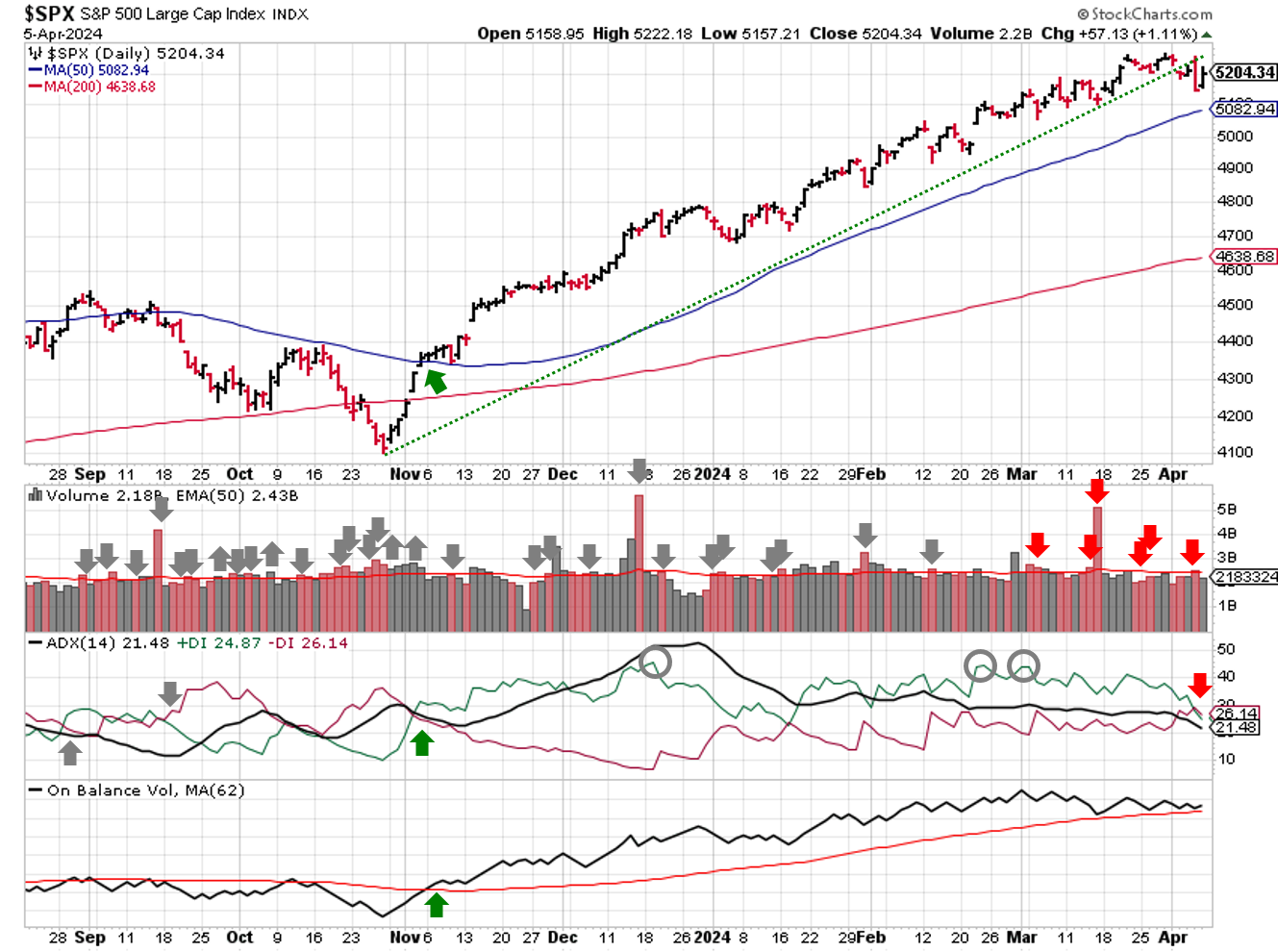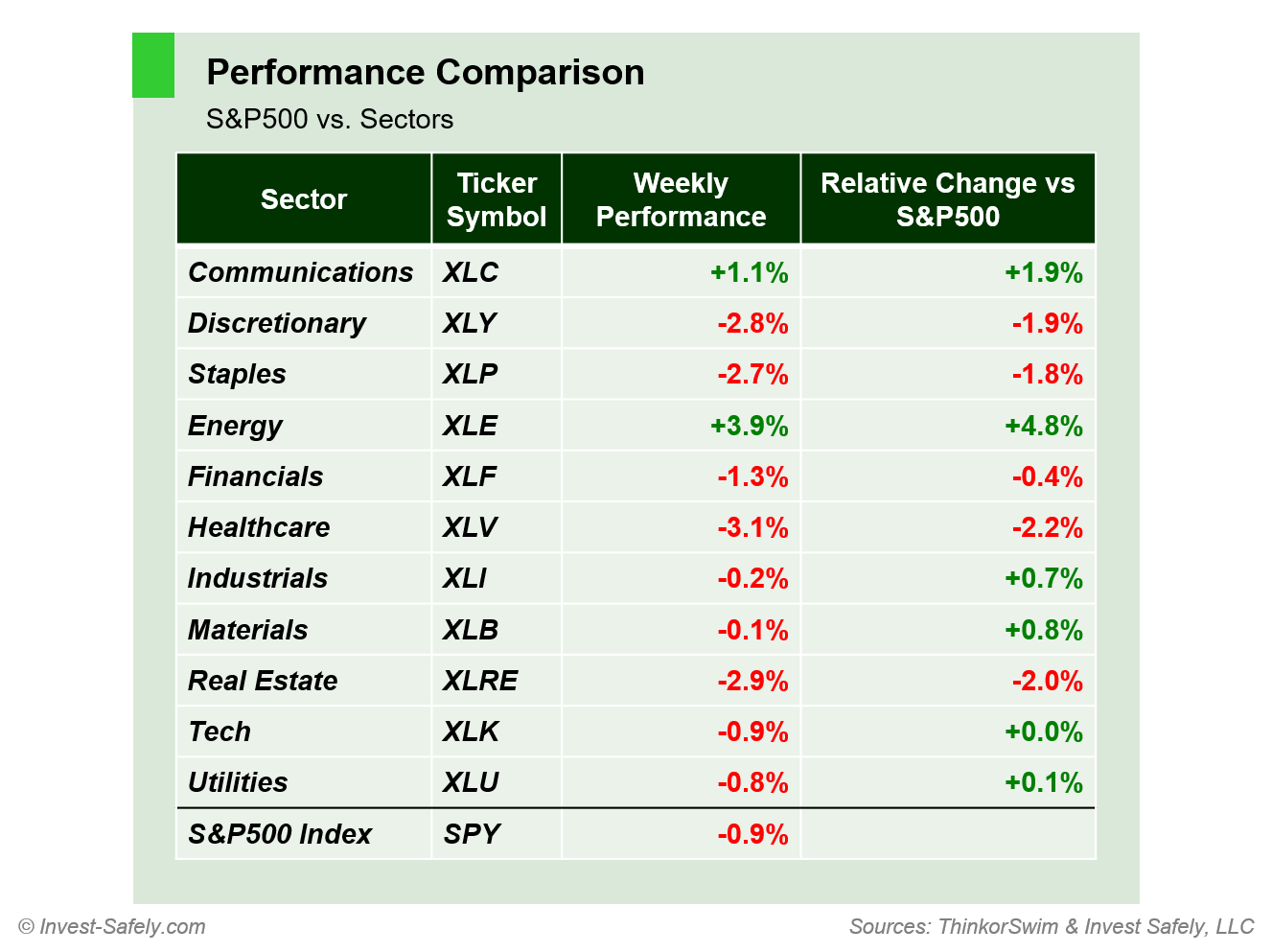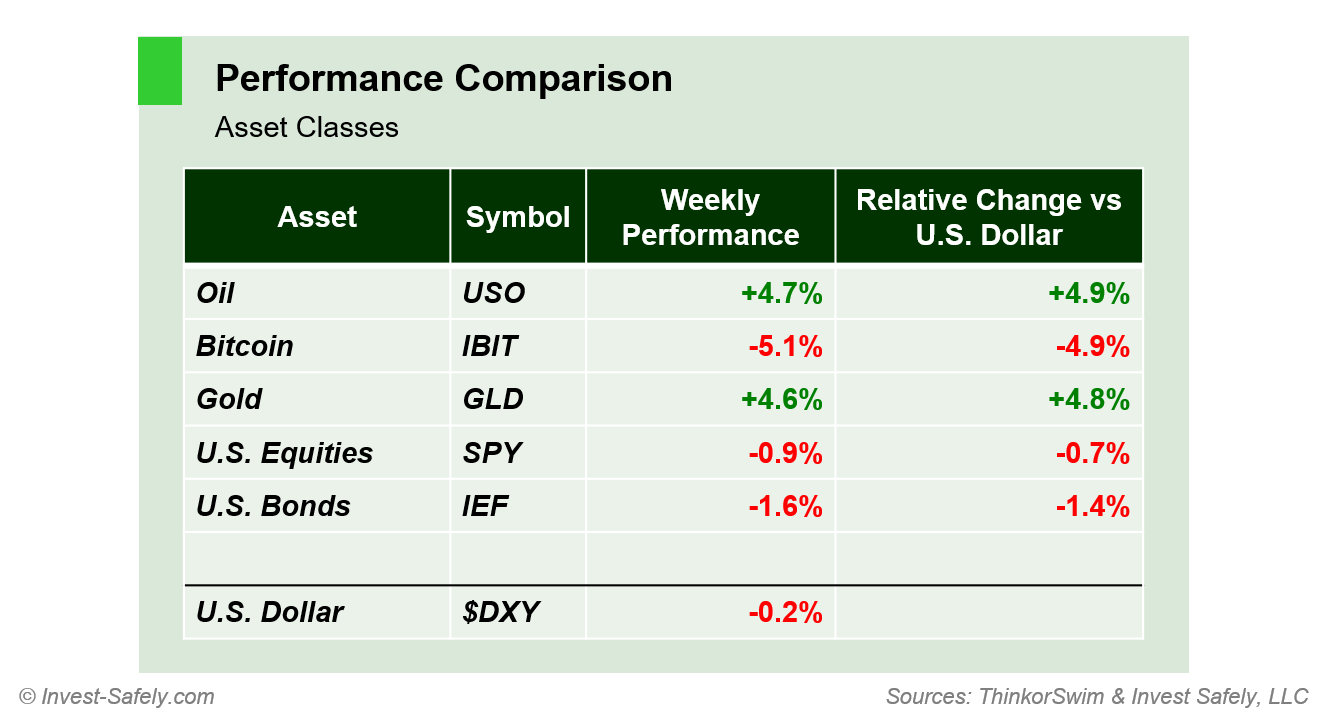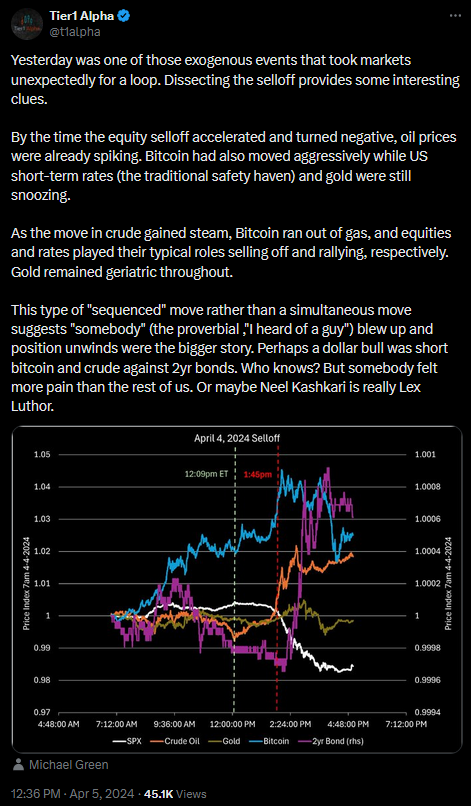Stock Market Outlook
For The Week Of March 7th =
Uptrend
INDICATORS
-
ADX Directional Indicators: Mixed
Price & Volume Action: Uptrend
On Balance Volume Indicator: Uptrend
The S&P500 ($SPX) dropped 1% last week, starting Q2 with a loss. The index also broke below the November trendline, though reaching a new high would re-establish the line and create a new support level. The index sits ~4% above the 50-day moving average, and ~12% above the 200-day moving average.
SPX Technical Analysis entering the Week of Apr 07 2024
The ADX signal is borderline, crossing over by the slimmest of margins on Friday. Monday's price action will determine if the signal can sustain the bearish view or reverts to bullish. Institutional selling is elevated, but not excessive, so the signal remains in an uptrend for this week. On Balance Volume also remains in an uptrend, but shows a negative divergence with price since mid-March.
S&P Sector Performance for Week 14 of 2024
Sector-wise, Energy ($XLE) outperformed by a wide margin. Heathcare ($XLV) was the worst performer, although several sectors were in rough shape. Oil and gold were the top asset classes last week; bitcoin was the worst.
Asset Class Performance for Week 14 of 2024
COMMENTARY
ISM Manufacturing PMI showed an expansion (reading above 50) for the first time in 16 months! ISM services PMI declined slightly, though still shows an expansion as well.
On the jobs front, JOLTS data was inline with expectations, while non-farm payrolls exceeded expectations, reaching its highest level in 10 months.
Speeches from Fed officials didn't provide much excitement. Some commentators thought Neel Kashkari may have spooked the markets, leading to Thursday's sell-off. His remarks were likely an example of correlation not causation. Instead, courtesy of T1 Alpha:
This type of "sequenced" move rather than a simultaneous move suggests "somebody" (the proverbial,"I heard of a guy") blew up and position unwinds were the bigger story. Perhaps a dollar bull was short bitcoin and crude against 2yr bonds. Who knows? But somebody felt more pain than the rest of us.
https://x.com/t1alpha/status/1776287914160525470
This week, CPI data and FOMC minutes are published on Wednesday, followed by PMI data on Thursday.
Best to Your Week!
P.S. If you find this research helpful, please tell a friend.
If you don't, tell an enemy.
Sources: Bloomberg, CNBC, Federal Reserve Bank of St. Louis, Hedgeye, U.S. Bureau of Economic Analysis, U.S. Bureau of Labor Statistics
Share this Post on:

How to Make Money in Stocks: A Winning System in Good Times and Bad.
It's one of my favorites.
I regularly share articles and other news of interest on:
Twitter (@investsafely)
Facebook (@InvestSafely)
LinkedIn (@Invest-Safely)
Instagram (@investsafely)
Invest Safely, LLC is an independent investment research and online financial media company. Use of Invest Safely, LLC and any other products available through invest-safely.com is subject to our Terms of Service and Privacy Policy. Not a recommendation to buy or sell any security.
Charts provided courtesy of stockcharts.com.
For historical Elliott Wave commentary and analysis, go to ELLIOTT WAVE lives on by Tony Caldaro. Current counts can be found at: Pretzel Logic, and 12345ABCDEWXYZ
Once a year, I review the market outlook signals as if they were a mechanical trading system, while pointing out issues and making adjustments. The goal is to give you to give you an example of how to analyze and continuously improve your own systems.
- 2015 Performance - Stock Market Outlook
- 2016 Performance - Stock Market Outlook
- 2017 Performance - Stock Market Outlook
- 2018 Performance - Stock Market Outlook
- 2019 Performance - Stock Market Outlook
- 2020 Performance - Stock Market Outlook
IMPORTANT DISCLOSURE INFORMATION
This material is for general communication and is provided for informational and/or educational purposes only. None of the content should be viewed as a suggestion that you take or refrain from taking any action nor as a recommendation for any specific investment product, strategy, or other such purpose. Certain information contained herein has been obtained from third-party sources believed to be reliable, but we cannot guarantee its accuracy or completeness.
To the extent that a reader has any questions regarding the applicability of any specific issue discussed above to his/her individual situation, he/she is encouraged to consult with the professional advisors of his/her choosing. Invest Safely, LLC is not a law firm, certified public accounting firm, or registered investment advisor and no portion of its content should be construed as legal, accounting, or investment advice.
The material is not to be construed as an offer or a recommendation to buy or sell a security nor is it to be construed as investment advice. Additionally, the material accessible through this website does not constitute a representation that the investments described herein are suitable or appropriate for any person.
Hypothetical Presentations:
Any referenced performance is “as calculated” using the referenced funds and has not been independently verified. This presentation does not discuss, directly or indirectly, the amount of the profits or losses, realized or unrealized, by any reader or contributor, from any specific funds or securities.
The author and/or any reader may have experienced materially different performance based upon various factors during the corresponding time periods. To the extent that any portion of the content reflects hypothetical results that were achieved by means of the retroactive application of a back-tested model, such results have inherent limitations, including:
Model results do not reflect the results of actual trading using assets, but were achieved by means of the retroactive application of the referenced models, certain aspects of which may have been designed with the benefit of hindsight
Back-tested performance may not reflect the impact that any material market or economic factors might have had on the use of a trading model if the model had been used during the period to actually manage assets
Actual investment results during the corresponding time periods may have been materially different from those portrayed in the model
Past performance may not be indicative of future results. Therefore, no one should assume that future performance will be profitable, or equal to any corresponding historical index.
The S&P 500 Composite Total Return Index (the "S&P") is a market capitalization-weighted index of 500 widely held stocks often used as a proxy for the stock market. Standard & Poor's chooses the member companies for the S&P based on market size, liquidity, and industry group representation. Included are the common stocks of industrial, financial, utility, and transportation companies. The S&P is not an index into which an investor can directly invest. The historical S&P performance results (and those of all other indices) are provided exclusively for comparison purposes only, so as to provide general comparative information to assist an individual in determining whether the performance of a specific portfolio or model meets, or continues to meet investment objective(s). The model and indices performance results do not reflect the impact of taxes.
Investing involves risk (even the “safe” kind)! Past performance does not guarantee or indicate future results. Different types of investments involve varying degrees of underlying risk. Therefore, do not assume that future performance of any specific investment or investment strategy be suitable for your portfolio or individual situation, will be profitable, equal any historical performance level(s), or prove successful (including the investments and/or investment strategies describe on this site).






